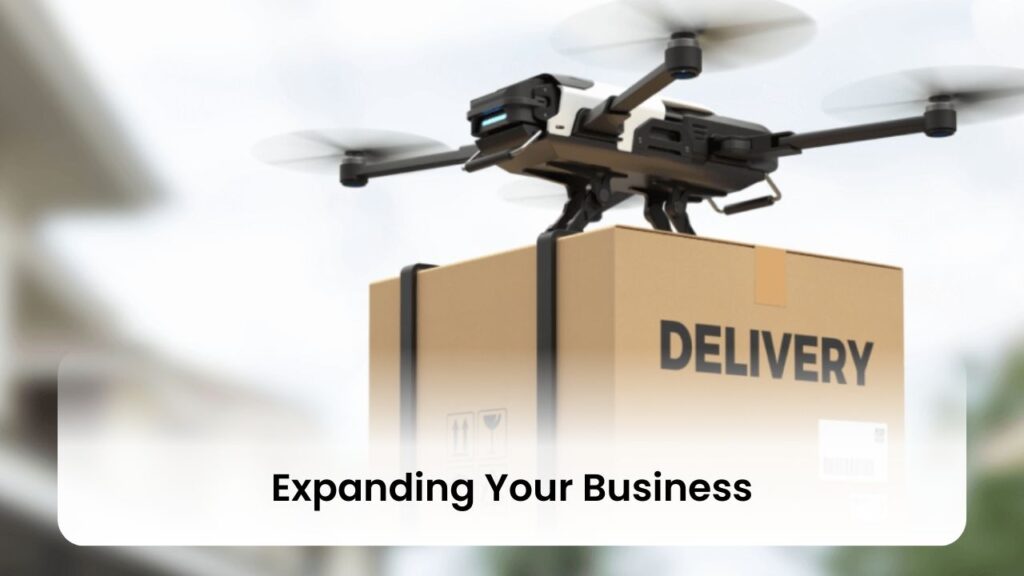With the drone industry’s rapid expansion, expected to surge to $48.88 billion by 2023, many entrepreneurs are seeking information on how to start a drone business. This growth not only presents a lucrative opportunity for drone services but also forecasts an increase in job creation and significant tax revenue. Key initial steps include obtaining the necessary Part 107 certification from the FAA and navigating through various federal and state drone regulations, underscoring the business’s legal groundwork and ensuring it operates within the law.
Identifying the right niche within the drone market, understanding drone insurance requirements, and crafting a comprehensive business plan are critical components for aspiring drone entrepreneurs. This article aims to guide readers through the process of turning their passion for drones into a viable drone business. By addressing crucial aspects such as the selection of drone types, marketing strategies for drone services, and the importance of continuous learning and adaptation, entrepreneurs can set a solid foundation for their venture and aim for success in this dynamic industry.
Identifying Niche in the Drone Market

Identifying the most suitable niche within the drone market is crucial for the success of your drone business. Here are some top drone business ideas and factors to consider:
Drone Business Ideas:
Inspections: Commercial, Residential, Industrial
Marketing Solutions: Drone Advertising/Marketing
Technical Services: Drone Repair, Mapping and Modeling
Specialized Fields: Construction, Mining, Oil/Gas, Land Monitoring
Agriculture: Precision Agriculture, Regular Monitoring
Creative Services: Photography, Videography
Public Safety and Surveillance
Choosing Your Niche:
Interest and Skills: Align your business with what you enjoy and your current skills. Consider both drone-related and unrelated skills and interests.
Market Demand: Research to find gaps in the market. Real estate photography, for instance, is popular but may face saturation.
Logistical Considerations: Factor in the commuting distance and the type of drone work prevalent in your area.
Market Research:
Industry Opportunities: Look into industries heavily investing in drones like construction, agriculture, and cinematography.
Potential Customers: Define who you would like to serve. This could range from real estate agents to farmers or event organizers.
Technological Advances: Stay updated with the latest in drone technology such as LiDAR, thermography, and multispectral imaging to offer cutting-edge services.
By thoroughly researching and aligning your interests with market needs, you can carve out a niche that not only is profitable but also enjoyable, ensuring long-term success in the burgeoning drone industry.
Drone Regulations and Certification
Navigating drone regulations and obtaining the necessary certifications are pivotal steps in establishing a legal drone business. Here’s a streamlined guide to help you understand and comply with the essential legal requirements:
FAA Registration and Certification:
- Recreational Pilots: Must register drones through the FAADroneZone portal and pass The Recreational UAS Safety Test (TRUST).
- Commercial Pilots: Require a Remote Pilot Certificate from the FAA. Registration of drones is mandatory via the FAADroneZone website.
- Age and Competency: Pilots must be at least 16 years old and capable of reading, speaking, writing, and understanding English. They must also be in a physical and mental condition that allows safe operation.
Operational Limitations:
- Visual Line-of-Sight: Drones must always be flown within visual line-of-sight of the operator.
- Airspace and Altitude: Operations are typically restricted to Class G airspace and must not exceed 400 feet in altitude or 100 mph in speed.
- Proximity Restrictions: Avoid flying near other aircraft, over groups of people, moving vehicles, and emergency response efforts.
Special Permissions and Waivers:
- Part 107 Waivers: Allows operations outside the standard regulations, such as flying at night or over people, provided specific safety measures are adhered to.
- LAANC Authorization: For flying in controlled airspace, commercial pilots can seek authorization through the Low Altitude Authorization and Notification Capability (LAANC) system.
Understanding these regulations and adhering to them not only ensures compliance but also enhances the safety and credibility of your drone business.
Creating a Business Plan
Creating a comprehensive business plan is essential when launching a drone business, as it lays out a roadmap for success and can be crucial for securing funding. Here are the core components that should be included:
Company Overview
- Legal Structure & Milestones: Detail the legal structure of your business (e.g., LLC, Corporation) and highlight any milestones already achieved.
- Products & Services: Describe what your drone business will offer, distinguishing features from competitors, and why these services are in demand.
Market Analysis
- Industry Insight: Provide an analysis of the drone industry, including size, growth rate, and upcoming trends.
- Customer Demographics: Identify your target market’s demographics, psychographics, and specific needs.
- Competitive Analysis: Analyze both direct and indirect competitors, focusing on their strengths and weaknesses to find your competitive edge.
Operational Strategy
- Daily Operations: Outline the day-to-day operations, including location, technology used (e.g., drone types and software), and team roles.
- Marketing Strategy: Employ the 4 Ps—Product, Price, Place, Promotion—to describe how you will attract and retain customers.
- Financial Projections: Include detailed financial forecasts such as income statements, balance sheets, and cash flow statements for the next five years, underscoring the business’s potential profitability.
This structured approach not only helps in maintaining clarity and focus but also enhances the potential to attract investors and partners by clearly presenting the opportunity and the roadmap to success.
Building Brand and Online Presence

Building a robust online presence is pivotal for the success of any drone business. A user-friendly, visually appealing website serves as the cornerstone of this digital strategy. It should not only reflect the brand’s commitment to quality but also be optimized for search engines to attract traffic with high purchase intent. Here are key strategies to enhance your brand and online visibility:
Professional Website Features
- User Experience: Ensure the website is easy to navigate and responsive across all devices.
- Visuals: Incorporate professional photos and videos of your drone operations to engage visitors.
- Content: Include a clear description of services, a portfolio of work, and client testimonials.
- Call to Action: Direct visitors clearly on how to engage your services or contact you.
Social Media Engagement
- Content Creation: Regularly post high-quality images and videos of your drone projects.
- Interaction: Engage with your audience by responding to comments and messages promptly.
- Hashtags: Use relevant hashtags to increase the visibility of your posts to a targeted audience.
Strategic Advertising
- Paid Campaigns: Utilize localized ads on platforms like Facebook and Google to reach potential customers.
- Partnerships: Collaborate with complementary businesses to broaden your market reach.
- Reviews: Encourage satisfied customers to share their positive experiences online, enhancing your business’s credibility.
By consistently applying these strategies, a drone business can not only increase its online presence but also build a strong brand that attracts and retains customers.
Networking and Collaborations
Networking and collaborating in the drone business are not just beneficial; they are essential for growth and innovation. Engaging with industry peers through various platforms and events can lead to numerous opportunities and advantages:
Professional Development and Industry Insight:
- Events and Meetups: Regular attendance at industry conferences, trade shows, and local meetups facilitates face-to-face interactions with peers and leaders in the drone market.
- Professional Associations: Joining organizations like the Association for Unmanned Vehicle Systems International (AUVSI) helps stay abreast of industry changes and participate in specialized training sessions.
Collaboration Opportunities:
- Project Partnerships: Collaborative ventures allow sharing of resources and expertise, tackling more complex projects that might be unmanageable individually.
- Online Platforms: Utilizing forums like LinkedIn or specialized drone community forums for virtual networking can spark partnerships even when in-person interactions are limited.
Enhancing Business Operations:
- Problem Solving: Leverage the collective knowledge of your network to find innovative solutions to common business challenges.
- Resource Sharing: Collaborations can lead to access to better technology and equipment, reducing the overhead costs associated with large-scale projects or high-end technologies.
By strategically networking and collaborating, drone entrepreneurs can expand their reach, enhance their services, and achieve sustainable growth in a competitive industr
Expanding Your Business

Expanding your drone business involves several strategic steps that can significantly enhance its growth and sustainability. Here’s a focused breakdown of key areas to consider:
Skill Development and Equipment Expertise:
- Continuous Learning: Stay updated with the latest drone technologies and regulatory changes. Regular training and certifications can help you maintain an edge in the industry.
- Equipment Upgrades: Invest in high-quality drones and related technology to improve service quality and expand service offerings.
Financial Planning:
- Revenue and Profit Projections: Based on market analysis, estimate potential earnings. For example, targeting $14,000 – $15,000 in the first year with strategic pricing and marketing.
- Cost Management: Keep a detailed record of expenses, which are estimated at around $2,000 for the first year, including equipment and insurance costs.
Marketing and Customer Engagement:
- Brand Visibility: Enhance online presence through SEO-optimized website content and active social media engagement.
- Customer Service: Build a reputation for reliability and quality service, encouraging customer reviews and referrals.
By focusing on these strategic areas, drone entrepreneurs can not only sustain but also significantly expand their business operations in the competitive drone market.
Explore More Categories:
Conclusion
Throughout this article, we’ve journeyed from the foundational steps of obtaining FAA certification and understanding the legal landscape to pinpointing the right niche within the expansive drone market. We’ve emphasized the importance of a solid business plan, a strong online presence, and the invaluable role of networking and strategic collaborations in fostering growth. These components not only prepare aspiring drone entrepreneurs to navigate the complexities of the industry but also position them for sustained success in a market poised for exponential growth.
As we look forward, the path to expanding a drone business is clear: continuous skill development, strategic financial planning, and an unwavering focus on customer engagement and brand visibility. By adhering to these principles, entrepreneurs can leverage the burgeoning opportunities within the drone industry, ensuring their passion for drone technology translates into a viable, flourishing business. The journey from passion to profit in the drone industry encapsulates a blend of innovation, determination, and strategic planning, marking the skies not just as a frontier for exploration but as a canvas for commercial success.
FAQs
Q. What are the steps to launching a successful drone business?
To start a successful drone business, you need to follow several key steps:
- Analyze the drone market to understand current trends and demands.
- Assess how well your personal interests and skills align with your business idea.
- Conduct a competitive analysis to see what others in the market are doing.
- Identify and evaluate your target market, including the advantages and disadvantages of focusing on this group.
- Decide on the services you will offer.
- Develop a pricing strategy, taking into consideration what your competitors charge.
Q. How can I start a career in the drone industry?
Beginning a career in drones involves several important steps:
- Start by learning the basics of drone operation and management.
- Obtain a drone license as required.
- Select a specific industry within the drone field that interests you.
- Pursue specialized training to enhance your skills in that area.
- Build a portfolio of your work to showcase your abilities.
- Network with professionals in the industry.
- Actively search for job opportunities in the field.
Q. What are the benefits of starting a drone business?
Starting a drone business is beneficial primarily due to the diverse range of services you can offer. These include aerial photography, videography, surveying, mapping, inspections, and even delivery services. The demand for these services is continuously increasing, making it a potentially lucrative endeavor.
Q. What are the initial costs involved in starting a drone business?
The initial costs to start a drone business can vary widely depending on several factors. These include the quality and quantity of drones purchased, licensing and insurance fees, marketing and advertising expenses, and any additional equipment or technology needed. It’s crucial to conduct a thorough cost analysis to plan your budget effectively.
